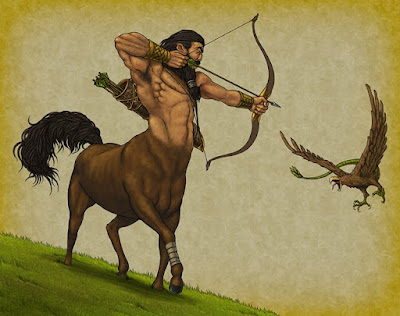THE WILD AND VULGAR CENTAURS did not honor any of the gods. They were half men and half horses, as cunning as wild men and as savage as untamed horses. They had inherited the worst dispositions of both.
The first centaurs had come tumbling out of a cloud that their father, Ixion, King of the Lapith people, had married, mistaking it for the goddess Hera. Zeus had created the cloud to test the ungodliness of the wicked king who wanted to carry off Hera. Ixion was severely punished for his ungodliness. He was condemned to whirl about forever in the underworld, tied to a flaming wheel, but his offspring, the centaurs, remained on earth as a scourge to the Lapith people.
The centaurs lived without law and order, stormed over fields, trampled crops, and carried off the Lapith women, and they ate raw meat.
The young centaurs were no better than their elders. They were poorly brought up by parents who kicked them and spanked them and left them to fend for themselves.
 |
| Chiron |
There was one centaur who was kind and wise and was fond of children. His name was Chiron. Though he looked like the other centaurs, he wasn't related to them at all. He was the son of Cronus the Titan and was immortal. Chiron was famous as the greatest teacher in Greece. Kings brought their small sons to him so he could raise them in the true spirit of heroes.
In his quiet cave on Mount Pelion, he taught them manly sports and how to use the healing herbs of the earth and how to read the stars in the sky. All his pupils returned to their homes exceeding their fathers in courage and knowledge.
One day Apollo brought to Chiron his little mortal son, Asclepius. His mother, a Lapith princess, had died, and Apollo asked Chiron to raise the boy.

Comments
Post a Comment